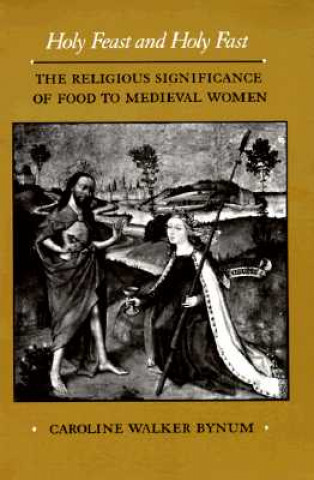
Kod: 04088465
Holy Feast and Holy Fast
Autor Bynum
In the period between 1200 and 1500 in western Europe, a number of religious women gained widespread veneration and even canonization as saints for their extraordinary devotion to the Christian eucharist, supernatural multiplicati ... więcej
- Język:
 Angielski
Angielski - Oprawa: Miękka
- Liczba stron: 464
Wydawca: University of California Press, 1988
- Więcej informacji o książce

Zobacz książki o podobnej tematyce
-

The Night Circus
33.96 zł -26 % -

Eileen
48.98 zł -14 % -
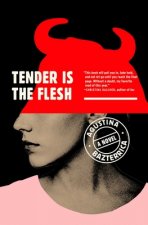
Tender Is the Flesh
71.97 zł -13 % -

Negative Space
76.10 zł -

Better Angels of Our Nature
61.28 zł -15 % -
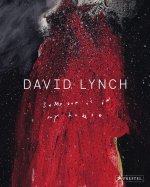
David Lynch
156.64 zł -7 % -
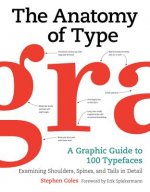
The Anatomy of Type: A Graphic Guide to 100 Typefaces
117.63 zł -5 % -

Lollipop Shoes (Chocolat 2)
50.29 zł -3 % -

The Poet Prince
77.61 zł -5 % -

Host
42.93 zł -23 % -
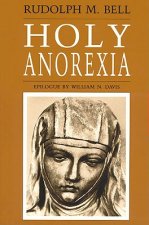
Holy Anorexia
145.86 zł -27 % -

Le Corbusier
118.14 zł -1 % -
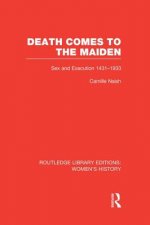
Death Comes to the Maiden
356.95 zł -

Rapid Eye Movement
117.13 zł
Podaruj tę książkę jeszcze dziś
- Zamów książkę i wybierz "Wyślij jako prezent".
- Natychmiast wyślemy Ci bon podarunkowy, który możesz przekazać adresatowi prezentu.
- Książka zostanie wysłana do adresata, a Ty o nic nie musisz się martwić.
Więcej informacji o Holy Feast and Holy Fast
Za ten zakup dostaniesz 117 punkty
 Opis
Opis
In the period between 1200 and 1500 in western Europe, a number of religious women gained widespread veneration and even canonization as saints for their extraordinary devotion to the Christian eucharist, supernatural multiplications of food and drink, and miracles of bodily manipulation, including stigmata and inedia (living without eating). The occurrence of such phenomena sheds much light on the nature of medieval society and medieval religion. It also forms a chapter in the history of women. Previous scholars have occasionally noted the various phenomena in isolation from each other and have sometimes applied modern medical or psychological theories to them. Using materials based on saints' lives and the religious and mystical writings of medieval women and men, Caroline Walker Bynum uncovers the pattern lying behind these aspects of women's religiosity and behind the fascination men and women felt for such miracles and devotional practices. She argues that food lies at the heart of much of women's piety. Women renounced ordinary food through fasting in order to prepare for receiving extraordinary food in the eucharist. They also offered themselves as food in miracles of feeding and bodily manipulation. Providing both functionalist and phenomenological explanations, Bynum explores the ways in which food practices enabled women to exert control within the family and to define their religious vocations. She also describes what women meant by seeing their own bodies and God's body as food and what men meant when they too associated women with food and flesh. The author's interpretation of women's piety offers a new view of the nature of medieval asceticism and, drawing upon both anthropology and feminist theory, she illuminates the distinctive features of women's use of symbols. Rejecting presentist interpretations of women as exploited or masochistic, she shows the power and creativity of women's writing and women's lives.
 Szczegóły książki
Szczegóły książki
Kategoria Książki po angielsku Humanities Religion & beliefs Christianity
201.30 zł
- Pełny tytuł: Holy Feast and Holy Fast
- Autor: Bynum
- Język:
 Angielski
Angielski - Oprawa: Miękka
- Liczba stron: 464
- EAN: 9780520063297
- ISBN: 0520063295
- ID: 04088465
- Wydawca: University of California Press
- Waga: 694 g
- Wymiary: 229 × 153 × 31 mm
- Data wydania: 07. January 1988
Ulubione w innej kategorii
-
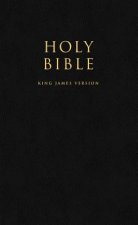
The Holy Bible - King James Version
43.44 zł -15 % -
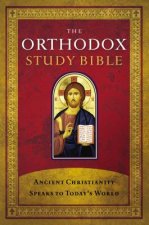
Orthodox Study Bible, Hardcover
205.84 zł -4 % -

Prayer Book
135.88 zł -

Yoga of Jesus
65.62 zł -4 % -

NRSV, Catholic Bible, Gift Edition, Leathersoft, White, Comfort Print
107.15 zł -23 % -

KJV Holy Bible, Personal Size Giant Print Reference Bible, Burgundy Leather-Look, 43,000 Cross References, Red Letter, Comfort Print: King James Versi
87.59 zł -3 % -

Jesus Calling, Pink Leathersoft, with Scripture References
70.45 zł -23 % -

Feeling is the Secret
34.37 zł -

KJV, Value Thinline Bible, Compact, Leathersoft, Brown, Red Letter, Comfort Print
52.01 zł -23 % -

KJV, Holy Bible, Larger Print, Paperback, Comfort Print
29.22 zł -23 % -

Holy Bible
102.51 zł -23 % -

Second Coming of Christ
266.12 zł -4 % -
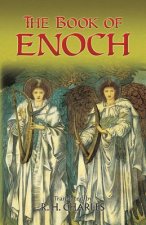
Book of Enoch
40.51 zł -23 % -
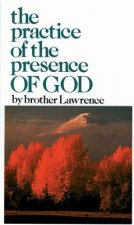
Practice and Presence of God
33.86 zł -4 % -

NKJV, Lighting the Way Home Family Bible, Hardcover, Red Letter Edition
202.31 zł -7 % -

Secrets of a Prayer Warrior
32.25 zł -

HOLY BIBLE: King James Version (KJV) White Compact Christening Edition
79.73 zł -23 % -

Disciplines of a Godly Man
65.92 zł -23 % -

Message Deluxe Gift Bible, Brown
72.97 zł -7 % -
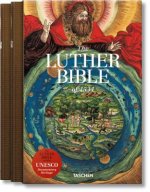
Luther Bible of 1534
223.68 zł -23 % -
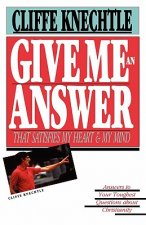
Give Me an Answer
126.30 zł -
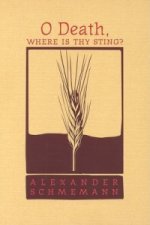
O Death, Where is Thy Sting?
52.01 zł -23 % -
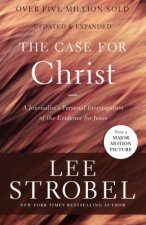
Case for Christ
45.66 zł -5 % -

NRSV, Catholic Bible, Gift Edition, Leathersoft, Teal, Comfort Print
143.64 zł -6 % -

Jesus Calling, Large Text Brown Leathersoft, with Full Scriptures
112.19 zł -6 % -

How We Love: Discover your Love Style, Enhance your Marriage (Expanded Edition)
71.97 zł -13 % -
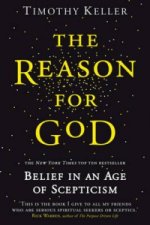
Reason for God
52.41 zł -15 % -

NKJV, Checkbook Bible, Compact, Bonded Leather, Black, Wallet Style, Red Letter
123.98 zł -6 % -

KJV Economy Bible
29.53 zł -5 % -
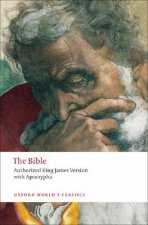
Bible: Authorized King James Version
81.54 zł -5 % -
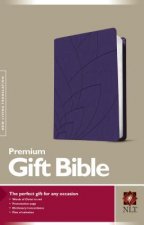
NLT Premium Gift Bible, Purple
77.61 zł -5 % -

CSB Compact Bible, Brown LeatherTouch, Value Edition
57.75 zł -5 % -

Angels
96.56 zł -6 % -

Crime and Punishment
84.37 zł -
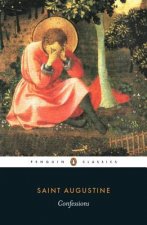
Confessions
42.73 zł -13 % -
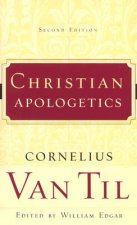
Christian Apologetics
77.61 zł -5 % -
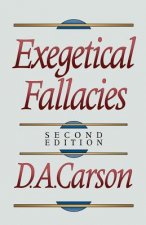
Exegetical Fallacies
97.77 zł -4 % -

Foundation Study Bible-KJV
123.98 zł -6 % -
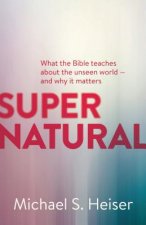
Supernatural
76.91 zł -7 % -

Embraced
84.87 zł -6 % -

Hillbilly Volume 2
73.68 zł -11 % -
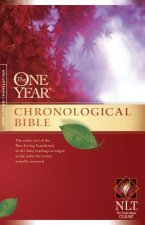
NLT One Year Chronological Bible, The
84.87 zł -6 % -

Real Kosher Jesus
72.87 zł -

ESV Vest Pocket New Testament with Psalms and Proverbs
33.66 zł -23 % -
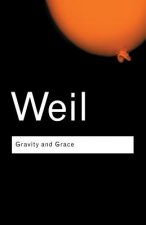
Gravity and Grace
98.58 zł -4 % -

Lacemaker
99.29 zł -

ESV Archaeology Study Bible
285.88 zł -5 % -

Resurrection of Jesus
206.44 zł -9 % -

Holy Bible: English Standard Version (ESV) Anglicised Black Gift and Award edition
52.01 zł -23 %
zadowolonych klientów
Od roku 2008 obsłużyliśmy wielu miłośników książek, ale dla nas każdy był tym wyjątkowym.
Copyright! ©2008-24 libristo.pl Wszelkie prawa zastrzeżonePrywatnieCookies



 21 milionów książek
21 milionów książek Dostawa 10.99 zł
Dostawa 10.99 zł (32) 444 93 66 (8-15.30h)
(32) 444 93 66 (8-15.30h)